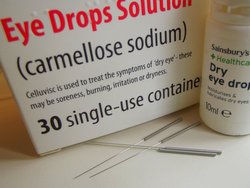
Tear analysis following adjunctive acupuncture for menopausal dry eye shows that the treatment increases tear protein synthesis and secretion, and improves clinical symptoms. A Chinese research team randomly divided 28 post-menopausal women with dry eyes, into two groups. One group received artificial tears, whilst the other received artificial tears plus acupuncture. Acupuncture was given three times per week for eight weeks.
After treatment, symptom reduction was significantly greater in the acupuncture group compared with the artificial tears only group. The combined treatment was found to increase synthesis and secretion of tear proteins, which have a role in maintaining the ocular surface. The authors conclude that acupuncture may be a therapy for treating postmenopausal dry eye disease.
(Proteomic analysis of tears following acupuncture treatment for menopausal dry eye disease by two-dimensional nano-liquid chromatography coupled with tandem mass spectrometry. International Journal of Nanomedicine, February 2017.)




